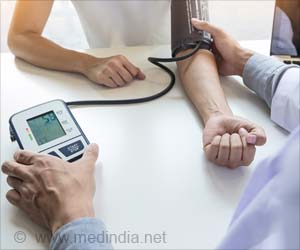- Scientific evidence does not support that copper water can treat high blood pressure
- Overuse of copper vessels can lead to toxicity and health issues
- Effective hypertension management relies on lifestyle changes and medical treatments
Drinking water from a copper vessel helps treat high blood pressure, claims a new Instagram post that has gone viral. This post, published on the Ayurvedic Cures website, proposes that keeping water in a copper vessel could help with hypertension. Let’s explore if there is any truth to this claim.
Advertisement
What is High Blood Pressure?
The World Health Organization (WHO) defines high blood pressure, or hypertension, as a blood pressure value of 140/90 mmHg or greater (1). Hypertension is a prevalent illness that, if not managed, can result in major health issues. Genetics, obesity, physical inactivity, advancing age, a high-salt diet, and excessive alcohol intake are all significant risk factors (2). Non-modifiable factors include a family history of hypertension and age, although environmental factors such as air pollution can also contribute.
Advertisement
Role of Copper in Maintaing Health
Copper is an essential trace mineral that helps the body produce energy, absorb iron, and maintain the immune system. It is absorbed in the small intestine and found primarily in bones and muscles (3).
Advertisement
Benefits of Copper Vessels
Traditionally, Ayurvedic medicine advised keeping water in copper containers known as “Tamra Jal” or “Copperised Water.” This procedure is thought to ionize and invigorate the water, possibly increasing its advantages. Some recent research has also found that copper possesses antimicrobial qualities, making water safer to drink. According to research published in the Journal of Health, Population, and Nutrition, copper can help provide microbially clean drinking water (4).
However, excessive drinking of water from copper vessels can cause copper poisoning. Long-term usage of copper vessels can lead to negative health effects such as liver and kidney damage (5).
Can Copper Water Treat High Blood Pressure?
Current scientific research does not back up the idea that drinking water from a copper vessel helps treat high blood pressure. A study published in the Clinical Nutrition Resaerch discovered no link between copper intake and hypertension (6). Dr. Prem Aggarwal, Cardiologist and Chairman of Sanjeevan Hospital in New Delhi, explains that while copper is required for many body activities, the minuscule amounts eaten from water held in copper vessels have no major effect on blood pressure. He underlines the need to use tried-and-true techniques to manage hypertension, such as lifestyle changes and medications given by healthcare specialists.
Tips to Manage Hypertension
Dr. Manav Aggarwal, Interventional Cardiologist at Sanjeevan Hospital, believes that hypertension cannot be cured, but it may be adequately treated. Dietary adjustments, such as reducing sodium intake and boosting fruits and vegetables, regular physical activity, alcohol consumption limits, smoking cessation, and stress management activities like as yoga and meditation are also important strategies. If lifestyle changes are insufficient, medication may be required (7).
While copper has some antibacterial characteristics, there is no scientific evidence to back up the idea that drinking water from a copper vessel may treat high blood pressure. In reality, overuse of copper vessels can cause toxicity and health problems. Therefore, the concept that copper water can alleviate hypertension is unfounded. Evidence-based medical advice and established lifestyle adjustments are essential for effective high blood pressure control.
References:
- Hypertension
(https://www.who.int/news-room/fact-sheets/detail/hypertension#:~:text=Hypertension%20is%20diagnosed%20if%2C%20when,days%20is%20%E2%89%A590%20mmHg.) - The global epidemiology of hypertension
(Mills KT, Stefanescu A, He J. The global epidemiology of hypertension. Nat Rev Nephrol. 2020;16(4):223-237. doi:10.1038/s41581-019-0244-2) - Copper
(https://ods.od.nih.gov/factsheets/Copper-HealthProfessional/#:~:text=consumer%20fact%20sheet.-,Introduction,neurotransmitter%20synthesis%20%5B1%2D3%5D) - Storing drinking-water in copper pots kills contaminating diarrhoeagenic bacteria
(Sudha VB, Ganesan S, Pazhani GP, Ramamurthy T, Nair GB, Venkatasubramanian P. Storing drinking-water in copper pots kills contaminating diarrhoeagenic bacteria. J Health Popul Nutr. 2012;30(1):17-21. doi:10.3329/jhpn.v30i1.11271) - Copper in Drinking Water
(National Research Council (US) Committee on Copper in Drinking Water. Copper in Drinking Water. Washington (DC): National Academies Press (US); 2000. 5, Health Effects of Excess Copper. Available from: https://www.ncbi.nlm.nih.gov/books/NBK225400/) - Daily Copper and Manganese Intakes and Their Relation to Blood Pressure in Normotensive Adults
(Lee YK, Lyu ES, Oh SY, et al. Daily Copper and Manganese Intakes and Their Relation to Blood Pressure in Normotensive Adults. Clin Nutr Res. 2015;4(4):259-266. doi:10.7762/cnr.2015.4.4.259)
Source-Medindia



